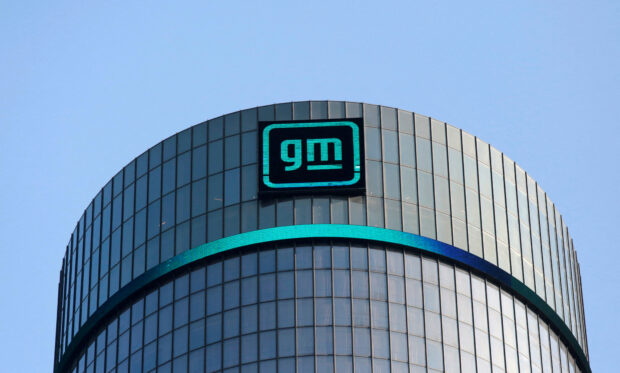UAW reaches deal with GM, ending strike against Detroit automakers

FILE PHOTO: The GM logo is seen on the facade of the General Motors headquarters in Detroit, Michigan, U.S., March 16, 2021. REUTERS/Rebecca Cook//
General Motors and the United Auto Workers (UAW) struck a tentative deal on Monday, ending the union’s unprecedented six-week campaign of coordinated strikes that won record pay increases for workers at the Detroit Three automakers.
The accord follows deals the union reached in recent days with Ford Motor and Chrysler-owner Stellantis – significant victories for auto workers after years of stagnant wages and painful concessions following the 2008 financial crisis.
“We wholeheartedly believe our strike squeezed every last dime out of General Motors,” UAW president Shawn Fain said in a video address. “They underestimated us. They underestimated you.”
The union officially suspended its strike against the Detroit Three. UAW local leaders will come to Detroit on Friday to consider the deal with GM, before taking terms to all union workers for ratification.
READ: UAW’s record deal could boost others’ wages as labor notches another win
“We are looking forward to having everyone back to work across all of our operations,” said GM CEO Mary Barra.
The new contracts will significantly raise costs for the automakers. The companies and some analysts have said the deals will make it harder for the Detroit Three to compete with electric-vehicle leader Tesla and nonunion foreign brands such as Toyota Motor.
The UAW won from GM roughly the same package of wage increases agreed with the other two automakers. Pay for veteran workers will rise by 33 percent and GM will give $2,500 in five payments to retirees through 2028.
Sources have said pension benefits were a sticking point in the UAW’s negotiations with GM, which has more retirees than Ford or Stellantis.
Fain said the union’s move on Saturday to strike a key GM engine factory in Spring Hill, Tennessee, “landed the knockout blow” that got the deal.
The contract reverses years of efforts by GM to create lower-paid groups of UAW workers at units such as component plants, parts warehouses and electric vehicle battery operations. It puts workers at GM’s battery joint-venture with South Korea’s LG Energy under the national agreement.
Fain said some workers at GM’s component operations will get pay increases of as much as 89 percent.
The contract also restricts use of lower paid temporary workers. “We have slammed the door on having a permanent underclass of temporary workers at GM,” Fain said.
The UAW also gained more sway over the companies’ investment decisions by securing the right to strike over future plant closures.
All three companies have said they do not plan to close existing factories as they shift to EVs. Yet the contract could force them to keep unprofitable plants open during a recession or period of slow sales for new models.
Higher costs
A series of walkouts began on Sept. 15, and nearly 50,000 workers out of nearly 150,000 UAW members at the Detroit automakers eventually joined. The strategy of escalating strikes cost the Detroit Three and suppliers billions of dollars.
UAW leaders called their contract fight part of a larger movement to reverse decades of economic setbacks for working-class Americans. Some analysts agreed.
“This is more than an auto industry story; it is a signal to the entire country that unionized workers can demand and get big wage increases,” said Patrick Anderson of the Anderson Economic Group.
READ: UAW’s new deal with Ford includes $8B in manufacturing investments
The new contract will cost GM $7 billion over 4.5 years in higher labor costs, two sources told Reuters. Ford said last week it would add $850 to $900 per vehicle in labor costs.
“Consumers will bear some of the cost burden over time … automakers will not have an easy time passing along all of the costs … and will have to seek efficiencies in other ways, or further limit production to more expensive vehicles that can absorb higher labor costs,” Cox Automotive’s chief economist, Jonathan Smoke, said.
Praise from Biden
U.S. President Joe Biden and politicians from both parties weighed in to support the UAW as the union’s fight gained popularity with voters. Michigan will again be a crucial swing state in the 2024 presidential election, and Fain made support for the union’s fight a condition of winning his endorsement. The UAW still has not formally endorsed Biden’s re-election.
“This historic contract is a testament to the power of unions and collective bargaining to build strong middle-class jobs while helping our most iconic American companies thrive,” Biden said in a statement. His aides had worried that a prolonged strike would damage the U.S. economy and the Democratic president’s chances of re-election in 2024.
The UAW has said it is committed to organizing workforces at other carmakers, making negotiations in 2028 between the union and the “Big Five or Big Six.”
Momentum toward deals accelerated over the past two weeks after UAW workers walked out at three of the most profitable factories in the world. The UAW eventually struck against nine plants.
“We have shown the companies, the American public and the whole world that the working class is not done fighting” Fain said. “In fact, we’re just getting started.”